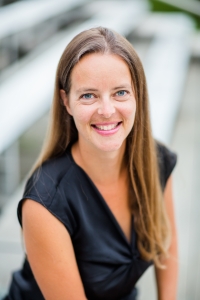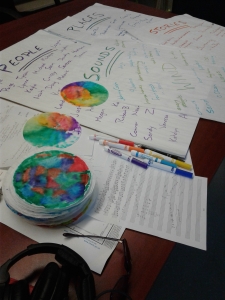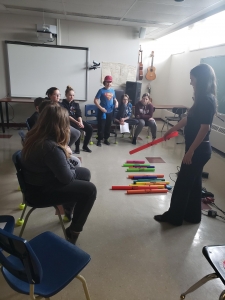ACE Artists in Education: Louise Campbell
This is the first feature of a new series that we will be sharing on ELAN News of Artists and Arts Facilitators who are working in ELAN’s Arts Community Education (ACE) Initiative. Louise Campbell is a Montreal-based musician whose professional hats range from clarinettist to conductor, community arts facilitator to musicians’ health therapist. As a performer, improviser and composer, Louise seeks to interrogate and renew the ways in which we make music by creating new works with everyone, regardless of age, ability, level of prior experience, or training.
This interview was conducted when Louise Campbell was engaged in her ELAN ACE residency in Grosse Île.

Photo: Vivian Doan
ELAN ACE: What are your artistic and teaching practices?
Louise: I am a musician, and I specialize in facilitating music and participatory arts. I will work with basically anyone who wants to make music, with any level of training. A huge part of what I do as a musician and a participatory arts musician is through improvisation.
My artistic and faciliatory practices are completely intertwined; they influence each other and often go together. I find that my participatory arts practice exposes me to very unique sounds that I wouldn’t be exposed to if I only worked in ensembles with professional musicians. It’s very much integrated in what I do. I have been facilitating and implementing participatory music for over 20 years. My project with ELAN Artists Community Education (ACE) is one way that I’ve been doing this work.
ELAN ACE: Can you describe the community and project that you are working on?
Louise: The community I am in is Grosse Île in the Magdalen Islands. The community has about 500 people in it, and the school has 42 students. I also engage with the seniors of the community. My project is very much about looking at place and community through music to strengthen community bonds. This is my first time here, and because of geography and weather, it is especially isolated in the winter. It is unusual in fact for me to be here right now as most visitors come in the summer. I’ve used my status as a newcomer to ground my connection in place. When I first got here, I improvised music to introduce where I’m from to the community. I then encouraged the students to introduce their favourite places to me and each other by thinking of the colours and sounds they associate with their favourite places. From there, stories started to emerge, which we are now using to create ‘radio plays’. We’ve built up a library of sound samples for this project including Foley-style sound effects, guitar loop pedals, boom whackers and other approachable instruments that I brought, and field recordings. The project has evolved a lot over the course of my month-long stay, a stay that was made possible through funding from the ELAN ACE Initiative and MELS Culture in the Schools.

Photo: Louise Campbell
ELAN ACE: What do you think will be the impact of this project on the community? Do you observe any changes in particular that indicate that the community or school will continue to support the arts?
Louise: I think the best people to answer this question are the people who live in Grosse-Île, since they are the people who make up this community. From my perspective, people here have a very strong sense of place, and the work we have been doing with music and sound may help them understand and articulate their sense of place in different ways. The sound library is a big part of how I hope the students will continue make music when I am gone. I always think of longevity when I’m doing projects like this one; the last thing I want to do is to introduce students to basic sheet reading and the first three notes of a recorder when I know there is no one here to follow-up on music taught this way. I hope that in this project, I am invoking imagination and helping the students develops skills and tools so they can continue to create music when I’m gone.
ELAN ACE: How has your own practice deepened through this project?
Louise: In my regular life in Montreal, I am always making sure that many different projects are growing every single day. To focus on only one project is incredible. The opportunity to think through place and be a newcomer in such an intense way is a very unique experience. This project was partially funded through MELS Culture in the Schools, and they ask that their artists-in-residence produce a work. When I make music, it is always for other people. With this project, I really want to make sure that the work I make is in service of the people here. I’ve proposed making music for an exhibit called People of the Sea, and the exhibit’s curator is very receptive. I’m trying to be very intentional about place as I create this piece, and in this way, I think that this project made me think of integrating place as part of community into my artistic process; this ties in with the artist-community emphasis of the ACE Initiative as well.

Photo: Amber Mckay
ELAN ACE: Can you think of an example of co-learning that you witnessed and participated in through this project?
Louise: This week, I wanted to start recording some of the stories with the students. There is a student here who is very much into technology and making music through technology. When I asked this student if he would help teach the other students how to download the app and access the sound library to create their stories, he instantly said yes. It became a really lovely case of student mentoring, from an older student to younger students. His self-esteem and leadership ability were boosted, and the students got to learn from someone other an adult.
ELAN ACE: What is your vision of the future relationship of the arts to education? What do you think is the value of integrating the arts into education?
Louise: I think that all people are inherently creative. Given the DIY era we live in, I think that we should be focusing on nurturing the creative abilities of students. Some students rebel when they don’t have creative input or control; I see this especially with kids who have difficulty integrating into a school. To approach learning creatively is crucial to have such students succeed at school, and at objectives later in life. Creativity also helps older people process events of their life. Many people haven’t been given the opportunity to be creative and understand their life through the arts, and creative activities help people access their experiences in ways they haven’t before.
Louise Campbell’s Website: http://louisecampbell.ca/wp/en/
Louise Campbell’s Instagram: @mlouisecampbell
Elan Quebec’s ACE Initiative’s Instagram: @elan_quebec_ace_initiative



